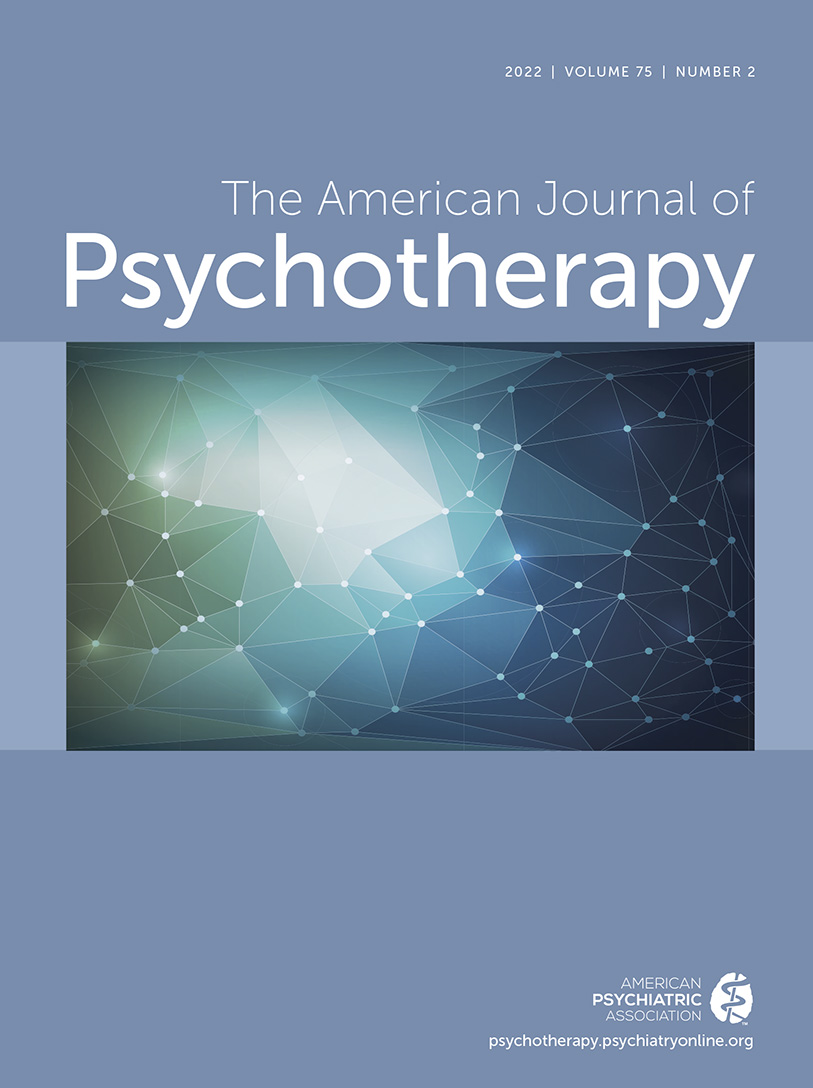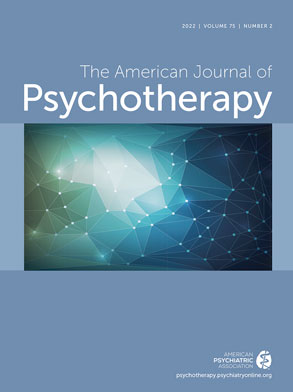In 1947, when the
American Journal of Psychotherapy was first published, founding editor Emil Gutheil, M.D., wrote, “This publication is dedicated to the advancement of psychotherapy. The material presented here is derived from Practice—and is designated for Practice. Special attention will be devoted to the borderlands of psychiatry, the psychosomatic medicine, the social sciences and the wide field of education” (
1). Revisiting Gutheil’s inaugural editorial and the earliest volumes of the
American Journal of Psychotherapy, I am surprised to see that the journal’s current priorities align remarkably well with those first articulated 75 years ago.
Today’s journal would be recognizable to its founders: the
American Journal of Psychotherapy retains its focus on the advancement of psychotherapy, broadly writ. Prioritizing clinical relevance, it publishes high-quality articles interrogating the practice, process, supervision, training, and implementation of psychotherapy. The journal recently published an entire issue devoted to consultation-liaison psychotherapy (
2) (psychosomatic medicine), and many of its articles focus on the social context of psychotherapy (e.g., barriers to psychosocial services for Latina versus Non-Latina breast cancer survivors (
3) or racism and psychotherapy (
4)). Still others examine the “wide field of education,” specifically as it applies to psychotherapy teaching and learning.
Although the journal’s objectives hew closely to its origins, its content has evolved over 75 years. Some articles published in the 1940s and 1950s would not be out of place today, such as one focusing on the rise of religious sectarianism and its impact on mental health (
5) or another examining reasons for nonadherence to psychiatric treatment (
6). Others, however, have not aged well. Contemporary readers will shudder with horror at an article on psychotherapy with patients following psychosurgery (
7) or at one that likens what today would be called gender-affirming surgery to physician-assisted suicide (
8). As Bruce Schwartz, M.D., and Scott Wetzler, M.D., former editors of the
American Journal of Psychotherapy, wisely write, “If anything can be gleaned by reviewing the journal’s history, it is that today’s clinical approaches and diagnostic mores will seem quaint to readers decades from now. We are as tied to our cultural and historical era as our predecessors were to theirs” (
9). These observations should encourage us to be ever vigilant about our biases and push us to remain open to new approaches proposed by our ever-growing cohort of contributing authors.
Instructively, Dr. Gutheil identified as a focus for the nascent journal the “borderlands of
psychiatry” (my italics) (
1). The articles in this journal were originally written for and by psychiatrists. Indeed, articles published in its inaugural issue were all written by psychiatrists, except one on “juvenile delinquency” written by a judge (
10). Today, the
American Journal of Psychotherapy occupies a unique position in the canon of academic publishing: to my knowledge, it is the only psychotherapy journal housed within a psychiatric professional organization. Although it welcomes voices and perspectives from a wide range of professional disciplines, the journal remains an intellectual home for psychiatrists interested in psychotherapy. Unlike in 1947, today’s psychiatrist-therapists are an endangered species (
11) who must advocate to protect their scope of practice (
12). True to its roots, the journal remains committed to the advancement of psychotherapy as practiced by psychiatrists.
As I peruse the “pages” of the current issue (the journal has migrated from print to online only in the last few years), I am struck by its salience to current events, attention to the teaching of psychotherapy, and careful consideration of social determinants of mental health—all topics that would have been embraced by the journal’s founder. The current issue kicks off with a triad of editorials by past and present editors on the occasion of the journal’s 75th year of publication, including perspicacious historical perspectives by T. Byram Karasu, M.D. (
13), and Drs. Schwartz and Wetzler (
9). Following these reflections on the journal’s past, the issue explores a wide range of themes relevant to the contemporary practice of psychotherapy. Drew A. Curtis, Ph.D., and Christian L. Hart, Ph.D., take on the controversial nosological subject of pathological lying, showing that therapists can reliably identify pathological lying in clinical vignettes when provided with a published definition of the syndrome (
14). Amanda Zayde, Psy.D., and colleagues report promising results from a small study of a transdiagnostic, bigenerational, mentalizing-focused group parenting intervention delivered by telehealth during the COVID-19 pandemic (
15). John F. Buss, B.S., and colleagues examine the factor structure of the Competencies of Cognitive Therapy Scale–Self Report, a measure designed to evaluate cognitive therapy skill acquisition, in a non–treatment-seeking sample (
16). Kimberly D. Becker, Ph.D., and colleagues report on the acceptability, feasibility, and instructional efficacy of a novel curriculum for enhancing the teaching of psychotherapy to child and adolescent psychiatry (CAP) fellows, finding that the curriculum was well received and relevant to CAP fellowship accreditation requirements (
17). Obadia Yator, M.Sc., and colleagues describe preliminary evidence of the acceptability, feasibility, and effectiveness of group interpersonal psychotherapy (IPT-G) for young Kenyan mothers who were HIV seropositive and had elevated depression symptom scores, finding no differences between groups in antiretroviral therapy adherence but significantly greater reductions in depression scores with IPT-G than with a waitlist control (
18). Irina Mindlis, M.P.H., M.A., and Andrea Hamilton, Ph.D., summarize the case of a Spanish-speaking woman facing financial insecurity and with early-stage breast cancer and elevated depression symptoms, including thoughts of self-harm, who was successfully treated with crisis psychotherapy by telephone during the COVID-19 pandemic (
19). Finally, the issue concludes with a laudatory review by Fran Weiss, L.C.S.W.-R., B.C.D., of Jerome Gans’s newest book,
Addressing Challenging Moments in Psychotherapy: Clinical Wisdom for Working With Individuals, Groups and Couples (
20). Collectively, these articles advance the journal’s mission as set forth in 1947 (
1).
As we look back to the journal’s origins and reflect on where the journal is today, much has changed with the practice of psychotherapy and with the journal. New modalities have become ascendant; discussions of manualized therapies, such as cognitive-behavioral therapy and interpersonal psychotherapy, now share space with articles exploring the practice and science of psychodynamic therapy. The field—and the journal—relies not only on clinical pearls garnered from therapist experiences but also on evidence collected from rigorous clinical trials. Authorship has expanded to include individuals with different professional backgrounds and identities, thereby broadening the lively discourse taking place within the journal’s pages. Despite these changes, the American Journal of Psychotherapy retains its foundational values, as first articulated by Dr. Gutheil, of clinical relevance, patient-centeredness, and intellectual rigor. These core principles are the journal’s North Star, pointing the way toward another 75 years of excellence.

